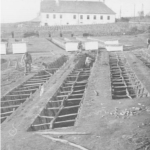How Google quietly funds Europe’s leading tech policy institutes. [New Statesman] “A recent scientific paper proposed that, like Big Tobacco in the Seventies, Big Tech thrives on creating uncertainty around the impacts of its products and business model. One of the ways it does this is by cultivating pockets of friendly academics who can be relied on to echo Big Tech talking points, giving them added gravitas in the eyes of lawmakers.”
Long term infrastructure. [Wrath of Gnon] “Like the stone lined canals in Kyoto, the terraced rice fields of Java allowing for millennia of continuous rice growing, the sandstone aqueducts of Italy still able to transport water after two millennia, the ancient Greek amphitheater still in use for plays and concerts, the cobblestone streets of Copenhagen that haven’t been resurfaced in five hundred years, we need to go back to thinking about our infrastructure not in terms of five year plans and technical efficiency, but in long term sustainability. If a bridge cannot be built that will last a thousand years, why build it? Why not build one that will last, even if it will be a less efficient or more expensive in the short run?”
COVID-19: false dichotomies. [BMC Infectious Diseases] “The COVID-19 pandemic has been riddled with false dichotomies, which have been used to shut down or polarize debates while oversimplifying complex issues and obfuscating the accompanying nuances. In this review, we aimed to deconstruct six common COVID-19-related false dichotomies by reviewing the evidence thoughtfully and thoroughly: 1) Health and lives vs. economy and livelihoods, 2) Indefinite lockdown vs. unlimited reopening, 3) Symptomatic vs. asymptomatic SARS-CoV-2 infection, 4) Droplet vs. aerosol transmission of SARS-CoV-2, 5) Masks for all vs. no masking, and 6) SARS-CoV-2 reinfection vs. no reinfection.”





